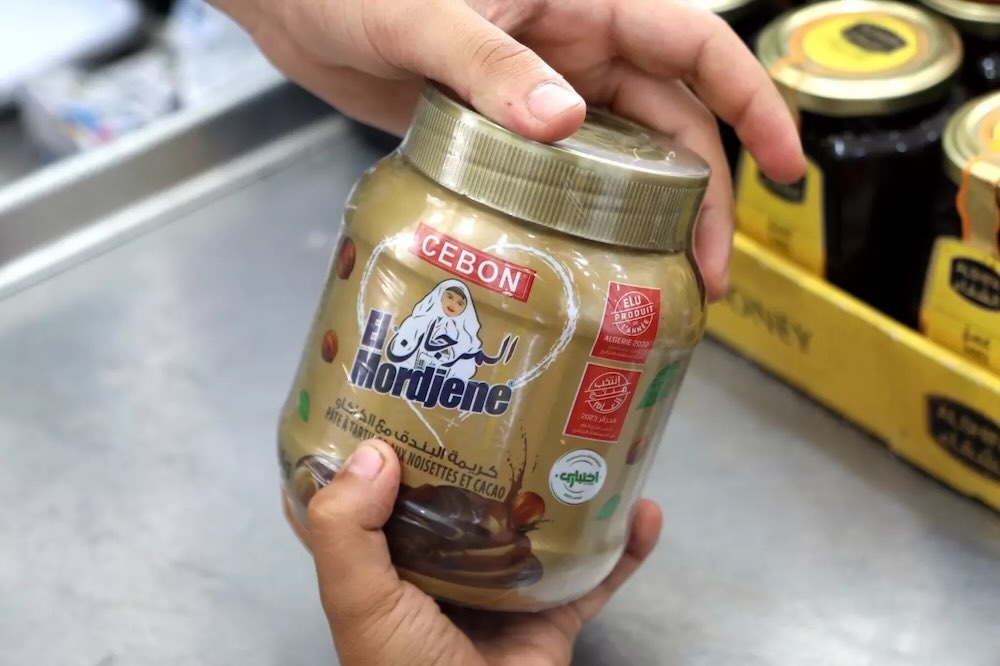El Mordjene: Social media meltdown in France as EU bans popular Algerian spread

French fans of a famous Algerian hazelnut spread have taken to social media to vent their frustration after its sale was banned in the European Union.
In recent weeks, El Mordjene, produced by the Cebon company, had captured the attention of food enthusiasts and social media users in France.
Celebrated for its creamy texture and flavour reminiscent of the milk chocolate bar Kinder Bueno, El Mordjene quickly became a viral sensation in France, leading to shortages in the small shops where it was usually sold as eager consumers rushed to get their hands on it.
Influencers on platforms such as Instagram and TikTok showcased their taste tests, describing the spread as "better than Nutella", generating significant buzz and driving its popularity to new heights.
New MEE newsletter: Jerusalem Dispatch
Sign up to get the latest insights and analysis on Israel-Palestine, alongside Turkey Unpacked and other MEE newsletters
However, this excitement was short-lived.
The French Ministry of Agriculture announced on Tuesday that El Mordjene had been banned within the EU, citing compliance issues with food safety regulations.
The primary reason for the ban is that Algeria is not among the countries authorised to export dairy products to the EU, which means El Mordjene cannot legally enter the European market, the ministry said. An investigation is “currently under way” to determine how the product found its way onto French shelves in the first place, it added.
Reports indicate that several containers of the spread were blocked at the port of Marseille.
Since the announcement, the ban has sparked a wave of reactions on social media.
While many lamented the loss of a beloved product, others took a cheeky approach, showcasing their remaining stock and joking about reselling it.
Bon il est temps de se l'avouer j'ai fait une razzia sur la El Mordjene pic.twitter.com/HInWFGpvrI
— Professeur Koro 🇫🇷🇪🇦(🇬🇮🇦🇩)🐧🇩🇿+🇸🇲 (@AndresDaFonollo) September 18, 2024
Translation: Well I have to admit it I stocked up on El Mordjene
Some created memes about being "forced" to purchase alternative hazelnut spreads.
À défaut de trouver la El Mordjene, j'ai acheté celle là pic.twitter.com/3x1DG5Zzsy
— Général Maximus (@LutetiaFidelis) September 13, 2024
Translation: Since I couldn't find El Mordjene one, I had to settle for this one
In a humorous twist, some social media users began to jest about France having the "seum" - a slang term meaning to feel bitter or resentful - suggesting that the EU’s ban on El Mordjene was a reaction to the sweet success of the Algerian product.
They playfully suggested that those suffering from this "seum" should try a fictional medication called "Seumecta", a play on Smecta, a medication used to treat digestive issues.
Some even created mock-up visuals of this fictive medication, adding a light-hearted touch to the ongoing debate over the ban.
Après le grand succès de #ElMordjene le prochain produit qui fera fureur #Seumecta 😂🇩🇿😂🇩🇿😂🇩🇿 #humour #Algerie pic.twitter.com/6PeVuppUl2
— 🍉𝑍𝑖𝑛𝑎🇵🇸ⵣ🇩🇿 (@zina95_94) September 12, 2024
Translation: After the major success of #ElMordjene, the next product that is going to be a hit is #Seumecta 😂🇩🇿😂🇩🇿😂🇩🇿 #humor #Algeria
Several people said they thought the ban could be a case of a protectionist strategy.
Mustapha Zebdi, president of Algeria's Consumer Protection Association (Apoce), suggested that the ban might be less about safety and more about shielding rival European products, such as Nutella, from competition.
This sentiment was shared by several social media users, who called for a boycott of the famous Italian chocolate-hazelnut spread.
Il y a pas que El Morjane "Bueno", mais le concurrent de Nutella est meilleure, 3 raisons d'en consommer :
— Fodil M 🍉 (@fodilmahani) September 17, 2024
- moins de sucre + de noisettes
- soutenir une boîte Dz
- boycott Nutella#ElMordjene pic.twitter.com/igP59U4hyq
Translation: There are other flavours besides El Mordjene 'Bueno', [El Mordjene hazelnut chocolate] is better than Nutella. Here are 3 reasons to try it: - less sugar, more hazelnuts - support a local Algerian brand - Boycott Nutella.
Haha trop fort mon frère @MhstudioArts 😂😂😂 #ElMordjene 🇩🇿 pic.twitter.com/i9E1uAix62
— Foot Fauteuil DZ 🇩🇿⚽♿ (@FootFauteuilAlg) September 14, 2024
Translation: Haha so good my brother @MhstudioArts 😂😂😂 #ElMordjene 🇩🇿 'It is not just in boxing that we knock out the Italians'
The French Agriculture Ministry said in a statement to Middle East Eye that the list of third parties approved to export products containing dairy to the EU is not new, adding that an investigation into El Mordjene was carried out last week after a "request for information from a forwarding agent (the operator responsible for handling border-crossing formalities for imported goods)... on the conditions under which the goods had been imported".
"The operator was informed that the goods were not authorised for import," the ministry said. "At this stage of the investigation, it seems likely that the goods may have been imported until now due to incorrect import declarations."
Ferrero, the chocolate and confectionery multinational behind Nutella and Kinder Bueno told MEE it refuted information "regarding its potential involvement in the ban on the marketing of any product in France".
MEE has also reached out to El Mordjene for comment.
Middle East Eye delivers independent and unrivalled coverage and analysis of the Middle East, North Africa and beyond. To learn more about republishing this content and the associated fees, please fill out this form. More about MEE can be found here.




